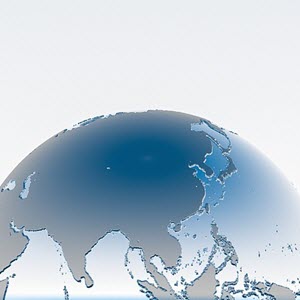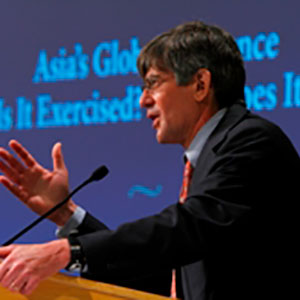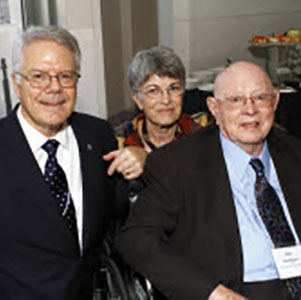National Asia Research Program (NARP) Advisory Council and Research Agenda 2010-11
The research agenda of the National Asia Research Program was set by the NARP Advisory Council. The Advisory Council consisted of outstanding leaders who have played a significant role in informing and shaping U.S. policy toward the Asia-Pacific. They were chosen based on their keen understanding of the policymaking process in the United States and of contemporary policy issues in Asia and their demonstrated commitment to strengthening U.S. policy. Council members were tasked with shaping and ensuring the policy relevance of the 2010-11 two-year research agenda for NARP.
Advisory Council
Robert A. Scalapino, University of California, Berkeley (Honorary Chair)
Thomas Christensen, Princeton University
June Teufel Dreyer, University of Miami
Thomas Fingar, Stanford University
Ellen Frost, Peterson Institute for International Economics
Aaron Friedberg, Princeton University
Terrill Lautz, Woodrow Wilson International Center for Scholars
T. J. Pempel, University of California, Berkeley
Thomas Pickering, Hills & Company
Kenneth Pyle, University of Washington
J. Stapleton Roy, Woodrow Wilson International Center for Scholars
Ashley Tellis, Carnegie Endowment for International Peace
Research Agenda (2010-11)
As Asia is increasingly integrated with the rest of the world, the combination of the region’s openness, dynamic growth, relative stability, and huge population translates into global power. No major global problem – such as terrorism, restoring economic growth, proliferation, pandemic disease, or climate change – can be solved without cooperation with and support from major Asian actors. It is important for policymakers to grasp the full extent, and limitations, of Asia’s global influence. They also need to know what Asians think about global issues and how Asians define their global responsibilities. Asia specialists in the United States need to engage in research and scholarship of direct relevance to policymakers who deal with regional and global issues.
The 2010-2011 NARP Research Agenda addresses these challenges head on. A major goal of the program is to encourage Asia specialists in the United States to engage in research and scholarship of direct relevance to policy-makers who deal with regional and global issues.
GEOPOLITICS AND GRAND STRATEGY
- What new great power configurations are emerging in Asia, and how are these affecting the regional and global balances of power?
- What are the respective roles of military power, economic power, and “soft” power?
- How do various Asian leaders view these changes, and how are they responding?
- Where, how, and why do the perceptions, policies, and strategies of key Asian actors clash or coincide with those of their neighbors and the United States?
- What are the implications for Asia’s regional institutions and security architectures?
GLOBAL TRADE, INVESTMENT, AND FINANCE
- How has the global financial crisis affected Asian trade, investment, and finance?
- How are patterns of economic interdependence and trade with Asia changing?
- Are Asians’ views of globalization changing, that is, are their views of the integration of economic activities across borders, through markets, changing?
- How do various Asian states view China’s development strategy and currency policy?
- How do individual Asian states perceive global financial institutions, and what are their strategies to influence or reshape such institutions?
- What are the centers of technological innovation in Asia, and how are key Asian states encouraging innovation through legal, education, and immigration policies?
INTERNATIONAL SECURITY AND MILITARY MODERNIZATION
- What are various Asian countries doing to modernize their military forces, and how do they explain what they are doing? What or whom do they see as the major threats?
- What assumptions about alliances, extended deterrence, and the territorial or resource ambitions of other states underlie military modernization efforts in Asia?
- Is a conventional arms race gaining momentum in Asia? If so, what form is it taking?
- How do Asians perceive the dangers of nuclear proliferation, terrorism, drug smuggling, and other activities carried out by problematic regimes and non-state actors?
- What do various Asian governments expect, fear, or want the United States or other powers to do with respect to existing security relationships to ensure peace and prosperity in the region?
ENERGY, RAW MATERIALS, HEALTH, FOOD, WATER, AND ENVIRONMENTAL PROTECTION
- What are different Asian states doing to assure supplies of energy, food, water, and raw materials at a reasonable price and to minimize the risk of interruption?
- What are various Asian states doing to prepare for the expected impact of climate change?
- How do concerns about shortages of key resources affect domestic priorities, laws and regulations, attitudes toward foreign investment, and the behavior of interest groups?
- What health measures are or soon will be in place to address pandemic and endemic disease, and are they adequate?
- What role do various Asians expect the United States and/or other powers to play in addressing or aggravating these challenges?
DOMESTIC TRANSITIONS AND TRANSFORMATIONS
- What are the domestic drivers of economic growth? Are they sustainable?
- What are the implications of population trends and health policies in Asia?
- Is education keeping pace with the needs of a modern Asia? How is it changing?
- What are the prospects for better governance, including accountability, transparency, and lower levels of corruption?
- What impact has rapid economic and political transformation had on the domestic politics and foreign policies of various Asian states? Where are new generations of leaders emerging?
- What have Asian governments done to promote regime legitimacy and to cope with the rise of “identity politics,” secession movements, and ethnic rebellions undertaken in the name of religion?




 2010 Asia Policy Assembly
2010 Asia Policy Assembly
 2010 Asia Policy Assembly: Keynote Address
2010 Asia Policy Assembly: Keynote Address
 David M. Lampton Awarded the Inaugural Scalapino Prize
David M. Lampton Awarded the Inaugural Scalapino Prize